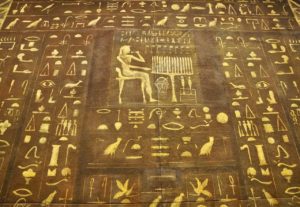
Do you have a Bible verse that keeps you going despite everything? Isaiah 64:3-4 is mine. By the end of this blog, maybe it will be yours, too. At the least, I hope it inspires and encourages you.
Here’s the Berean Study Bible translation: “When You did awesome works that we did not expect, You came down, and the mountains trembled at Your presence. From ancient times no one has heard, no ear has perceived, no eye has seen any God besides You, who acts on behalf of those who wait for Him.”
The English words are amazing. The Hebrew words, even more so.
That’s because Hebrew is a physical language. Each word speaks of an action. Throughout history, that’s made a big difference in how people have responded to God’s Word. Hebrews experienced God and His promises. Greeks pondered them with a more passive approach.
Let me highlight five key Hebrew words in Isaiah 64:3-4 so you can see how this works. Why? Because it’s really cool, and it will blow your mind about God!
“When You did awesome works that we did not expect, You came down, and the mountains trembled at Your presence. From ancient times no one has heard, no ear has perceived, no eye has seen any God besides You, who acts on behalf of those who wait for Him.”
Awesome works (yare)
Yare is the Hebrew term for a good kind of fear—the reverent awe we should have for God. (The Hebrews’ word for “bad fear” translates in English to dread of impending disaster.) We have no need to fear God when we are His children, for He is committed to doing awesome works for us.
Did not expect (qavah)
Gavah in this verse means we weren’t watching and waiting for what You did. The original word has a connotation of a rope being twisted or stretched, creating enduring tension. It takes work to keep tension on a rope; for example, to pull a bucket from a well. Are we stretched with tension in actively anticipating what God is doing, even when we can’t see it?
Your Presence (panim or paneh)
Panim or paneh means faces. God, the Three in One, sees and knows everything about us. Also, in some way or another (including ways we can’t comprehend), the Trinity is always operating on our behalf.
Heard (shema)
This is my favorite Hebrew word. You may have heard of THE Shema, a prayer every Jewish person learns at an early age. It starts with Shema Israel:
“Hear, O Israel: The LORD our God, the LORD is One. And you shall love the LORD your God with all your heart and with all your soul and with all your strength.” (The entire prayer is in Deuteronomy 6:4-9.)
Shema means to listen, hear, and respond to God’s words in obedience. Literally, love the Lord with everything you’ve got and give Him everything you’ve got—your passion, your enthusiasm, your resources, your desires, your plans, your life!
Acts (asah)
Asah means to do or to make. God the Creator is still actively involved in His creation. He continually creates opportunities, circumstances, and miracles for His glory and our benefit.
See how every word comes with a call to action?
Yare / awesome works = We revere God.
Gavah / Did not expect = We are never lax about God. We actively anticipate God’s workings and remain responsive to Him.
Panim / Your Presence = When we keep our eyes fixed upon Jesus, we glimpse God’s face.
Shema / Hear = We listen, hear, and respond to God’s Word.
Asah / Act = God never stops working in and through His creation; He is continually creating opportunities for us to love, serve, and obey Him.
Each word fairly bursts with action!
We could unpack much more from these two verses, but the point of seeing how Hebrew is a physical, action-oriented language is this: God never intends for us to simply read and walk away from His Word. It is active and transformational—and it deserves our response. May we act on that today!
Never miss a blog!
God never intends for us to simply read and walk away from His Word. Share on X Embedded in Hebrew words is the implication of a desired action. Share on X





Leave a Comment